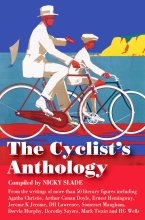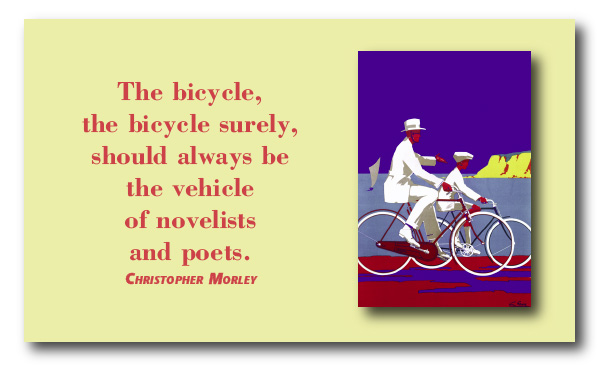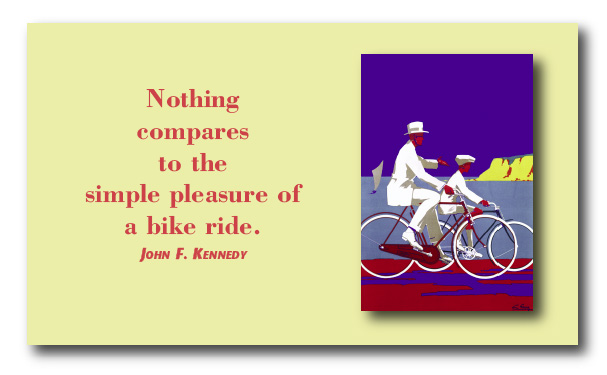Practical guidebooks for the more adventurous traveller.
— The Herald

The Cyclist's Anthology
Excerpt:
Sample 1: A Passage to India (E.M. Forster, 1924)
Contents | Introduction | Sample 1: A Passage to India (E.M. Forster, 1924) | Sample 2: Tandem Trouble, 1914 (Jerome K. Jerome) | Sample 3: Mulga Bill's Bicycle, 1896 (A.B. 'Banjo' Paterson)
A Passage to India, 1924
E.M. Forster
E.M. Forster’s novel, based on his own experiences in India, shines a harsh light on the relationship between the British Raj and the educated Indian in the 1920s. Neatly juxtaposing aspects of both cultures, the novel begins with the young Indian Dr Aziz dining with two Indian friends in the city of Chandrapore when he receives a summons from Major Callendar, his superior at the hospital.
India – a hundred Indias – whispered outside beneath the indifferent moon, but for the time India seemed one and their own, and they regained their departed greatness by hearing its departure lamented, they felt young again because reminded that youth must fly. A servant in scarlet interrupted him; he was the chuprassi of the Civil Surgeon, and he handed Aziz a note.
’Old Callendar wants to see me at his bungalow,’ he said, not rising. ’He might have the politeness to say why.’
’Some case, I daresay.’

’I daresay not, I daresay nothing. He has found out our dinner hour, that’s all, and chooses to interrupt us every time, in order to show his power.’
’On the one hand he always does this, on the other it may be a serious case, and you cannot know,’ said Hamidullah, considerately paving the way towards obedience. ’Had you not better clean your teeth after pan?’
’If my teeth are to be cleaned, I don’t go at all. I am an Indian, it is an Indian habit to take pan. The Civil Surgeon must put up with it. Mohammed Latif, my bike, please.
The poor relation got up. Slightly immersed in the realms of the matter, he laid his hand on the bicycle’s saddle, while a servant did the actual wheeling. Between them they took it over a tintack. Aziz held his hands under the ewer, dried them, fitted on his green felt hat, and then with unexpected energy whizzed out of Hamidullah’s compound.
’Aziz, Aziz, imprudent boy…’ But he was far down the bazaar, riding furiously. He had neither light nor bell nor had he a brake, but what use are such adjuncts in a land where the cyclist’s only hope is to coast from face to face, and just before he collides with each it vanishes? And the city was fairly empty at this hour. When his tyre went flat, he leapt off and shouted for a tonga.
He did not at first find one, and he had also to dispose of his bicycle at a friend’s house. He dallied furthermore to clean his teeth. But at last he was rattling towards the civil lines, with a vivid sense of speed. As he entered their arid tidiness, depression suddenly seized him. The roads, named after victorious generals and intersecting at right angles, were symbolic of the net Great Britain had thrown over India. He felt caught in their meshes.
(From A Passage to India, 1924)

The Cyclist's Anthology
Excerpts:
- Contents
- Introduction
- Sample 1: A Passage to India (E.M. Forster, 1924)
- Sample 2: Tandem Trouble, 1914 (Jerome K. Jerome)
- Sample 3: Mulga Bill's Bicycle, 1896 (A.B. 'Banjo' Paterson)
Price: £4.99 buy online now…
Latest tweets